
Keith Ludlum and Terry Slaughter are two slaughterhouse workers who helped organize the union at the Smithfield Foods plant in Tar Heel, North Carolina.
A bruising 16-year battle, the fight brought together African American, white, and Mexican immigrant workers, who were able to find common ground despite the company’s attempts to use racial division and immigration enforcement to try to defeat them. The interviews have been edited into narrative form by David Bacon.
Keith Ludlum:
When I was 22 I heard about this new hog plant, and went and applied. They put me in the livestock department, right in the belly of the beast. It was a real shock—seeing how workers were treated. I saw hogs fall on people, and then the supervisors doing everything to get the hog back on the line. They were more concerned with the hogs then with the people. A dead animal was more valuable than a live human being.
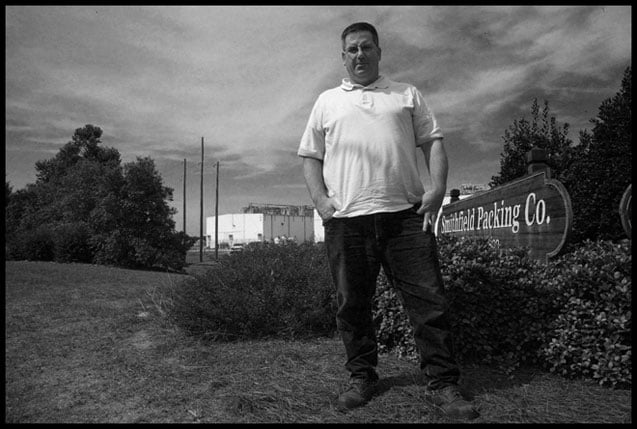 Keith Ludlum is president of United Food and Commercial Workers Local 1208. (Photo: David Bacon)
Keith Ludlum is president of United Food and Commercial Workers Local 1208. (Photo: David Bacon)
Most people working there were African American. I never thought of myself as better than anyone. My dad came from poor, rural North Carolina. He taught me we’re all the same. Treat people how you want to be treated. Work hard and you’ll be rewarded for hard work. I had no idea what unions were. Like most people in the South, most of my ideas about unions came from the companies I worked for, which were very anti-union.
Then an older African American guy, a humble spirit, broke his leg. The next day when I came in he was in the break room with his leg in a cast on crutches. He said they told him that if he didn’t come in to work he’d be fired. The supervisor wouldn’t even let him park near the place where he worked in the plant—those places were just for management. That’s when I knew I wouldn’t keep working under those conditions. One of the ladies invited me to a union meeting in Lumberton and I went.
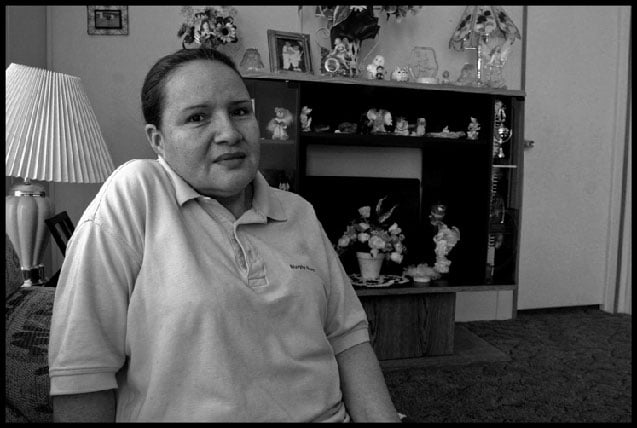 Nilsa Morales was injured and then terminated at the Smithfield pork plant in Tar Heel. (Photo: David Bacon)
Nilsa Morales was injured and then terminated at the Smithfield pork plant in Tar Heel. (Photo: David Bacon)
I knew what they were doing to people was wrong. And the only fix that I could see was the union. So I took union cards into the plant. I thought the law would protect me, and if I lost my job, it wasn’t the end of the world. I was naive. Now that I ‘m older I know corporations don’t care about the law, but I was young. I thought, Americans believe in the law and everyone has to obey it.
After three weeks I had most of livestock signed up. But other workers told me the supervisors were watching me. Then they started writing me up. Finally they called me in. They had the regional guy in charge of all the farms, the livestock manager, and the assistant plant superintendent all in there to fire me.
The livestock manager knew what he was doing was wrong. He couldn’t even look at me. I looked up at him and said, “You can’t hold it against someone for trying to make things better.” They walked me out, and when we got to the lobby there were two deputies standing there to escort me to my car.
I said to myself, “You picked the wrong m__________r.” And that started a 12-year fight. That was 1994.
Terry Slaughter:
I was born in Georgia, but we moved to New York City when I was 10. My wife’s family was from North Carolina, and after we got married she decided to move down here. I didn’t want to leave the city life, but finally I decided it was time to grow up.
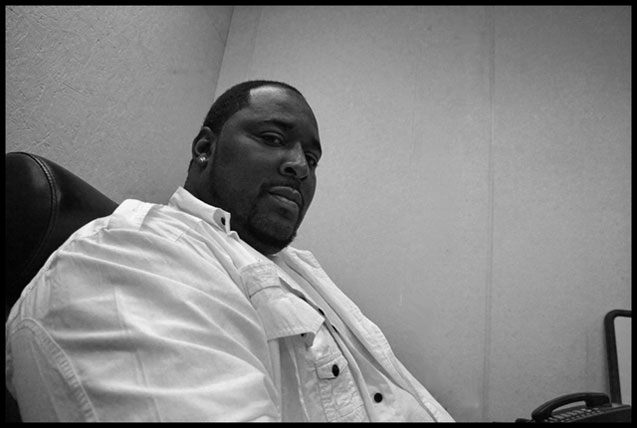 Terry Slaughter is secretary-treasurer of UFCW Local 1208. (Photo: David Bacon)
Terry Slaughter is secretary-treasurer of UFCW Local 1208. (Photo: David Bacon)
When I came down here, it was the first time I had a regular job, where I was paid by the hour. Before, I was never paid on the books. At first I worked at a Black and Decker factory on the line. In 2002, after three years, I came to Smithfield. It was a whole new world.
I started in the livestock department, taking animals off the truck. I was scared of the hogs the first week. I called them pigs. They told me, they’re not pigs. That’s a city name. The plant was killing 32,000 hogs a day. In eight years there was never a day they didn’t have hogs.
If a hog gets crippled or falls, someone has to pick it up. They weigh 400 pounds. You have to push it into a barrel, and if you’re a man, they say, you do it by yourself. With all the walking and carrying hogs, I lost 75 pounds the first year I was there.
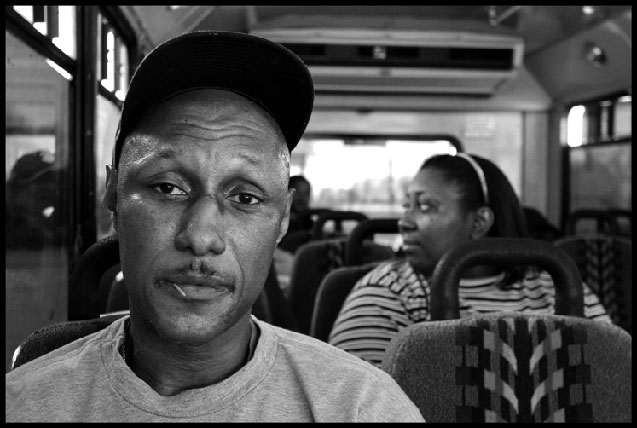 Lorenzo Reed, a worker at the Smithfield pork plant in Tar Heel, North Carolina, in the parking lot in Dillon, South Carolina, where workers wait for vans to take them to their jobs. It takes hours to get there. (Photo: David Bacon)
Lorenzo Reed, a worker at the Smithfield pork plant in Tar Heel, North Carolina, in the parking lot in Dillon, South Carolina, where workers wait for vans to take them to their jobs. It takes hours to get there. (Photo: David Bacon)
At first I liked it. Then in 2005 reality set in. I started seeing the way management was treating the employees. Hogs would run over a worker and managers would move the person to the side so they could keep the animals moving. The hogs were more important than the people. But what could I do? One person alone couldn’t do anything.
In July 2006 I heard people start talking about forming a union. That was what I was waiting for. I knew about unions in New York. Some were skeptics and some were scared. But I thought, if we don’t stand for something, we won’t count for anything.
One morning, it was almost 100 degrees outside. Keith and a couple of others went to get water from the cooler, but it was hot and had ants in it. We said, “We’re not going to work if we don’t have clean and cold water.” So 25 of us got some chairs and we sat in the middle of the barn. We crossed our arms and said, “We’re not going to do anything until we get what we deserve.” For eight hours we did nothing.
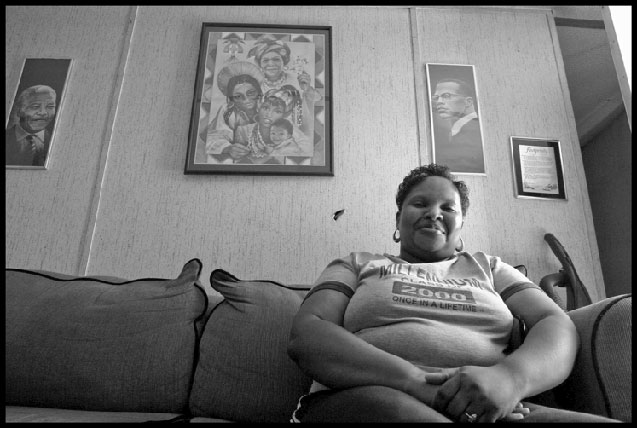 Vanessa McCloud, a worker at the Smithfield pork plant in Tar Heel, North Carolina. On the wall behind her are portraits of Nelson Mandela and Malcolm X. (Photo: David Bacon)
Vanessa McCloud, a worker at the Smithfield pork plant in Tar Heel, North Carolina. On the wall behind her are portraits of Nelson Mandela and Malcolm X. (Photo: David Bacon)
The supervisors started to go crazy. When livestock stops, the rest of the plant does, too, since it doesn’t have any more hogs on the line. The hog trucks were lined up at the gate, and the animals were dying from heat in the trucks. When they started losing money and realized we weren’t going back to work, supervisors tried to run the hogs themselves. But they couldn’t do it. They’d never done that work before.
I thought for sure we were going to get fired. But they realized they weren’t going to be able to produce if we weren’t working. The very next day we got clean and cold water. That’s when I knew we had a chance. From there it snowballed.
Keith Ludlum:
I won at the labor board, and all the appeals later in court. Finally they reinstated me in 2006. By then the whole community knew what was happening. By the time I came back there were only a few people in livestock who remembered me. I wore a “Justice at Smithfield” shirt when I went back in, and even had my company ID photo taken with the shirt on.
The first day I started asking people to sign cards. Some people thought I had the plague, but other people were really excited. I always let the company throw the first punch, but I always hit them harder, and workers saw that. You can’t show any kind of weakness or make any mistakes. So we slowly built a core group in livestock. That department controls the whole plant. Terry and some of the others joined. They started believing, and we started doing actions in the plant.
 Julio Vargas led a walkout among Smithfield’s subcontracted cleaning workers for higher wages and safer working conditions. He was later fired. (Photo: David Bacon)
Julio Vargas led a walkout among Smithfield’s subcontracted cleaning workers for higher wages and safer working conditions. He was later fired. (Photo: David Bacon)
By then there were a lot of immigrants in the plant. After Smithfield ran through the workforce around here, you started seeing a lot more immigrants working in the plant. The company thought the undocumented would work cheap, work hard, and they wouldn’t complain. It happened very quickly, and there wasn’t an established community here before. Someone made a personal effort to get the workforce here. The company had to make that happen.
I went back in July 2006, and the walkout over the firings of the undocumented people happened in November 2006. At first African Americans and others viewed the firings as just a Latino problem, but during the walkout I tried to explain that it was a worker problem. People are just trying to earn a living and raise a family. The company took advantage of them, and then made them pay the price.
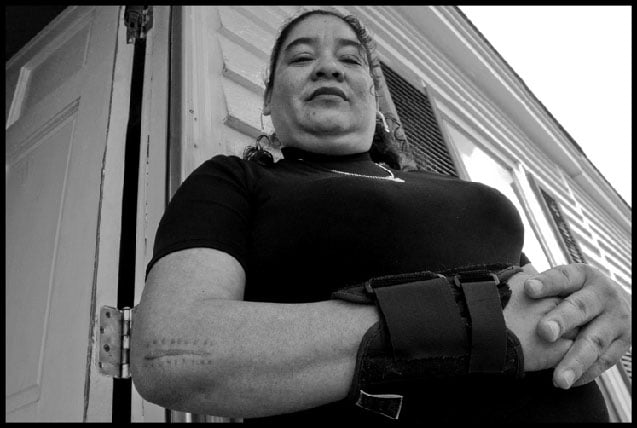 Rose Marie Rodriguez was injured on the job at the Smithfield pork plant in Tar Heel, and then fired. (Photo: David Bacon)
Rose Marie Rodriguez was injured on the job at the Smithfield pork plant in Tar Heel, and then fired. (Photo: David Bacon)
They’d fired 50 or 70 people, and they said more were coming. People were panicked. They knew they were going to be next. Were they going to wait, or do something about it? That’s when they said, “Let’s shut them down.” It was really empowering to see all those workers stand up together. We just took over the parking lot. We had total control. When you’ve got enough people, nothing can stop you. [Although most of the people who walked out were Latino immigrants, some others also participated.]
We were trying to buy some time for people, and the company agreed to extend the time by two months [that is, workers then had two more months to come up with valid documents or, if they couldn’t, to leave their jobs]. It was the best we could do, but it did show people we can change the way the company makes a decision.
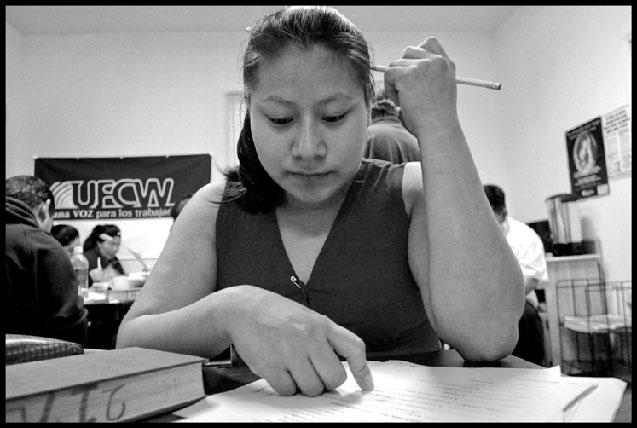 A Smithfield worker studies English in a class organized by the United Food and Commercial Workers. (Photo: David Bacon)
A Smithfield worker studies English in a class organized by the United Food and Commercial Workers. (Photo: David Bacon)
The next February ICE [Immigration and Customs Enforcement] hit this area again, and Eduardo [a UFCW organizer] and I followed them around with cameras. With cameras on them, ICE would handle going into people’s houses differently. You could tell they were mad at us, and kept trying to push us back. They surrounded one trailer, and turned off the power to try to smoke the people out. It was 100 and some degrees, and the air conditioning was cut off. There were children in there.
But you could see that staying just wasn’t worth it to people, and they were going to move on. They didn’t know if they were going to be arrested, or how their family might be split up.
Terry Slaughter:
If you’re a good worker, they should let you work. Granted, you’re supposed to be documented. We know that. But this was a tactic by Smithfield at the time when we were trying to get the union in. That was a dirty low blow. If you were undocumented, the company knew. They knew who they were hiring.
They wanted people to believe that the union had called ICE on the people, so we’d lose the Latino vote. I would say a vast majority of the Latino workers were a yes vote for the union. But people were scared if they were undocumented. If I was undocumented, I wouldn’t want to be out in front either.
There were more Native Americans and African Americans coming into the workforce at that time. I don’t think the change in the workforce made a big difference by the time of the election. The union won because it was time.
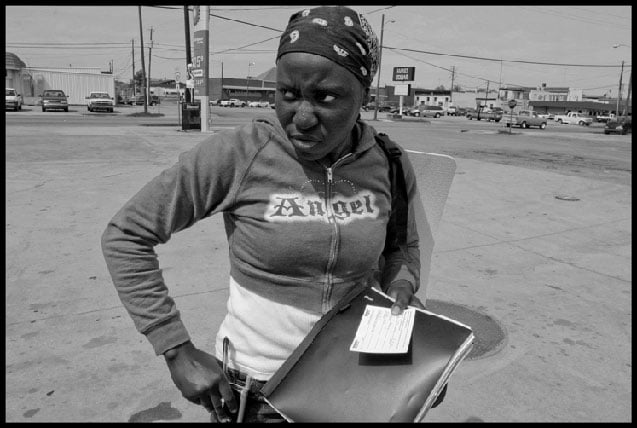 A Smithfield worker signs a union card in the parking lot in Dillon, South Carolina, where workers wait for vans to take them to their jobs. (Photo: David Bacon)
A Smithfield worker signs a union card in the parking lot in Dillon, South Carolina, where workers wait for vans to take them to their jobs. (Photo: David Bacon)
Keith Ludlum:
I think there had to have been cooperation [between ICE and the company]. The company wants someone they can exploit—the dream employee. You were supposed to come to work, take whatever they paid you and however they treated you, and if you didn’t keep your mouth shut you should go back home. It was a perfect employee for a corporation, other than a slave.
But I’m sure the company saw these people were getting organized. The workforce in the shadows was uniting, expecting rights, expecting to be part of the community. That’s not what the company wanted. It wasn’t going to be a workforce anymore that would be quiet and obedient.
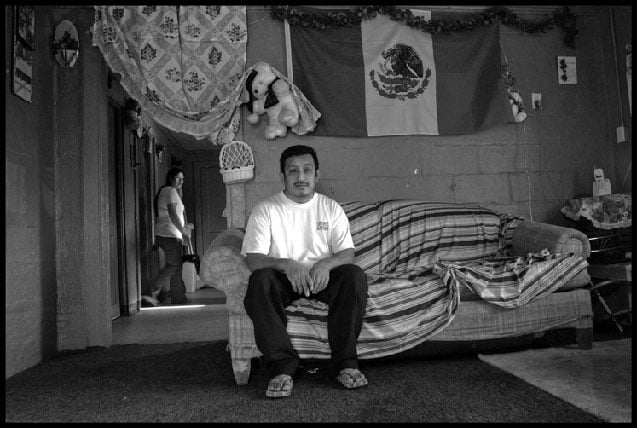 Everildo Lopez, a worker who was injured and then fired. (Photo: David Bacon)
Everildo Lopez, a worker who was injured and then fired. (Photo: David Bacon)
For a while relationships between Latinos and African Americans were strained. Some African Americans thought Latinos were taking jobs they could do, and keeping the wages down. But three was also a sense of envy after Latino workers walked out over the firings, and showed their power. Many started saying, we need to do something, and started demanding the MLK holiday. [That year on Dr. King’s birthday, several hundred workers refused to work, despite company threats, and went to a rally instead, slowing production drastically.] The following year Smithfield named MLK an official holiday for the whole company. People started building bridges, standing together.
Everyone saw the power of that unity in the 2006 walkout. But it was something people did out of necessity. Afterwards, they had to start getting ready to leave. It would have been different if we’d been able to stop the terminations permanently. That would have made a difference. Once people started leaving, it broke up those core groups that made things happen. The damage had been done to the immigrant population, and the undocumented started leaving, getting away from the hotspot. You can’t blame them. Who wants to get arrested, with your kids waiting to be picked up? Immigrants have that extra fear. We all have to worry about being fired. They have to worry also about being arrested, separated from their families and deported.
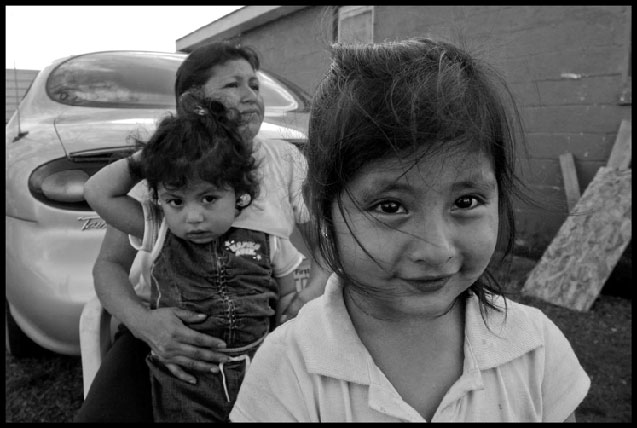 Carolina and her sister stay at the house of Everildo Lopez, an injured Smithfield worker. (Photo: David Bacon)
Carolina and her sister stay at the house of Everildo Lopez, an injured Smithfield worker. (Photo: David Bacon)
The company terminated me again in 2007. They wanted me out of there. So I worked for the union on the campaign here. After we won the election in 2008 we always wanted the union here to be run by workers from the plant. It’s got to be people who live here, not just someone for whom it’s a job. I’ve been a member of the local since it was chartered in 2009, so I ran for president after the first contract had been negotiated.
The union has been able to improve the wages, even though we’ve been in the worst recession since the Depression. Thirty people who were fired unjustly are back on the job with back pay. To me that’s enough—firing is like a death. People in this country are two paychecks away from being homeless. The company can’t fire people for getting hurt the way they did before, and we can time the lines and slow them down.
When the union made the agreement with the company for the election in 2008, the union had to agree that I couldn’t go anywhere near the plant. I couldn’t even be on the grass on the roadway outside. Now I’m the local president. [The agreement the union won established fairer conditions for the election.]
Terry Slaughter:
Relations between Latinos and African Americans today are great. When you look at the culture in the plant today, everyone’s together. Supervisors can’t yell at you—no more. They can’t downgrade you—no more. It used to be that if you said anything you got fired—no more.
Between all the shop stewards and elected officers, there’s over 100 of us. When we speak, plus the 5,000 people who work there, you hear a roar. When it’s a few of us together, we’re a force. But when it’s all of us together, we’re a union.
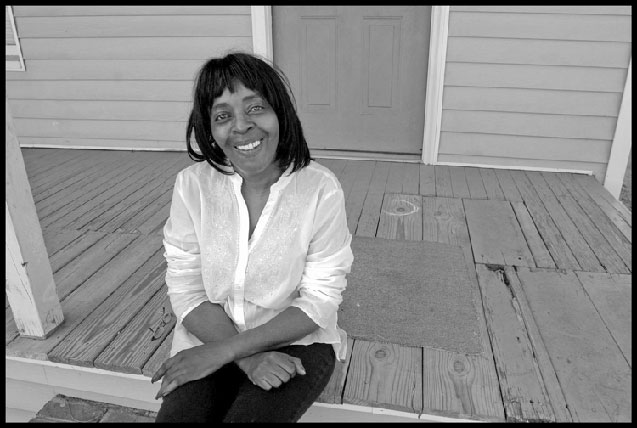 Ronnie Simmons, a worker and leader of the union organizing effort at the Smithfield pork plant in Tar Heel. Today she’s a member of the executive board of UFCW Local 1208. (Photo: David Bacon)
Ronnie Simmons, a worker and leader of the union organizing effort at the Smithfield pork plant in Tar Heel. Today she’s a member of the executive board of UFCW Local 1208. (Photo: David Bacon)
This story is one of three narratives that illustrate the human experience behind the grim statistics that document the results of the North American Free Trade Agreement and an immigration system manipulated by employers. For more, read the narratives and read “How US Policies Fueled Mexico’s Great Migration.” This work was a project of The Investigative Fund, a project of The Nation Institute.
Reprinted with permission from Labor Notes.
Come to the Labor Notes conference May 4-6 in Chicago, the biggest gathering of grassroots labor activists and all-around troublemakers out there! Don’t miss a weekend of education, agitation, and inspiration.
Media that fights fascism
Truthout is funded almost entirely by readers — that’s why we can speak truth to power and cut against the mainstream narrative. But independent journalists at Truthout face mounting political repression under Trump.
We rely on your support to survive McCarthyist censorship. Please make a tax-deductible one-time or monthly donation.